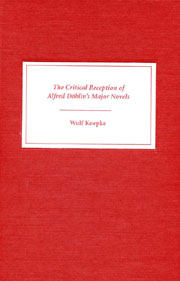Book contents
- Frontmatter
- Contents
- Preface
- Major Novels by Alfred Döblin
- Introduction
- Part One Contemporary Reviews
- Part Two Döblin Scholarship
- 3 Döblin Scholarship: The First Approaches
- 4 Die drei Sprünge des Wang-lun
- 5 Wadzeks Kampf mit der Dampfturbine
- 6 Wallenstein
- 7 Berge Meere und Giganten
- 8 Manas
- 9 Berlin Alexanderplatz
- 10 Babylonische Wandrung
- 11 Pardon wird nicht gegeben
- 12 Amazonas
- 13 November 1918
- 14 Hamlet oder Die lange Nacht nimmt ein Ende
- 15 Döblin's Impact on Other Writers
- Conclusion
- Bibliography
- Index
6 - Wallenstein
from Part Two - Döblin Scholarship
Published online by Cambridge University Press: 05 February 2013
- Frontmatter
- Contents
- Preface
- Major Novels by Alfred Döblin
- Introduction
- Part One Contemporary Reviews
- Part Two Döblin Scholarship
- 3 Döblin Scholarship: The First Approaches
- 4 Die drei Sprünge des Wang-lun
- 5 Wadzeks Kampf mit der Dampfturbine
- 6 Wallenstein
- 7 Berge Meere und Giganten
- 8 Manas
- 9 Berlin Alexanderplatz
- 10 Babylonische Wandrung
- 11 Pardon wird nicht gegeben
- 12 Amazonas
- 13 November 1918
- 14 Hamlet oder Die lange Nacht nimmt ein Ende
- 15 Döblin's Impact on Other Writers
- Conclusion
- Bibliography
- Index
Summary
DÖBLIN'S WALLENSTEIN, written during the First World War and dealing with another catastrophic event, the Thirty Years' War of 1618–48, has always been considered a commentary on war, violence, and possible ways to achieve peace. Above all, it was a historical novel, but one of a very peculiar kind. This is where the emphasis of scholarship has been so far.
Wolfdietrich Rasch, in his article “Döblins Wallenstein und die Geschichte,” first published in the Festschrift for Döblin's seventieth birthday, begins with the global statement that Wallenstein is the great historical novel of the postwar period. It is the first work that reveals the entire span of Döblin's narrative art (228). It is wrong to consider Döblin's oeuvre only from the perspective of Berlin Alexanderplatz. There is in fact a unity among the first four great novels, Wang-lun, Wallenstein, Berge Meere und Giganten and Berlin Alexanderplatz, and it is mandatory to see the “Gleichberechtigung,” the equal stature, of these four novels (228).
It is also a falsehood, writes Rasch, that Döblin found his true topic and setting only in Berlin Alexanderplatz (228). Döblin's work is based on an extraordinary power of imagination, presented with optimal precision and fullness of detail (229). It is the opposite of “Geschichtsschreibung mit literarischen Mitteln” (230), but just because Döblin does not dwell on facts and figures, does not keep the reality of past ages from coming to the surface.
- Type
- Chapter
- Information
- The Critical Reception of Alfred Döblin's Major Novels , pp. 104 - 114Publisher: Boydell & BrewerPrint publication year: 2003



